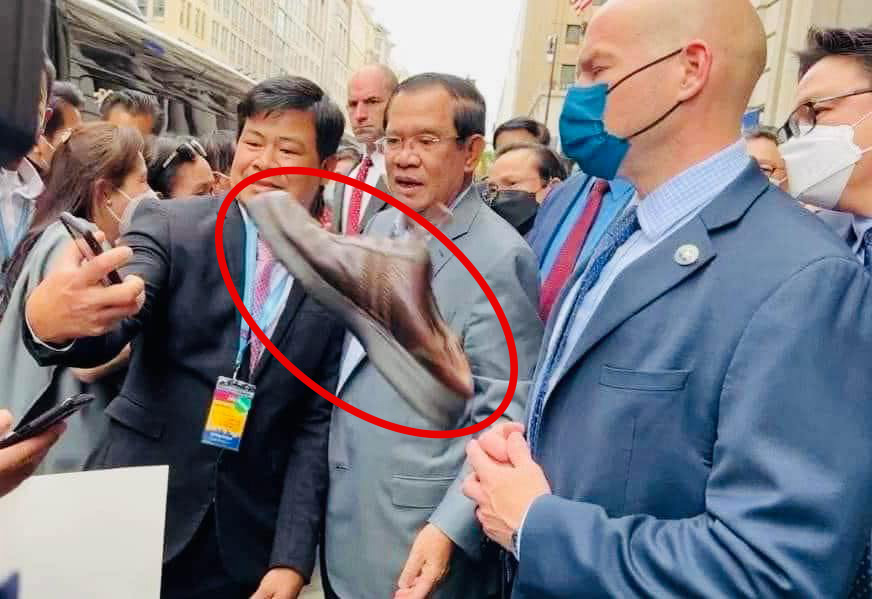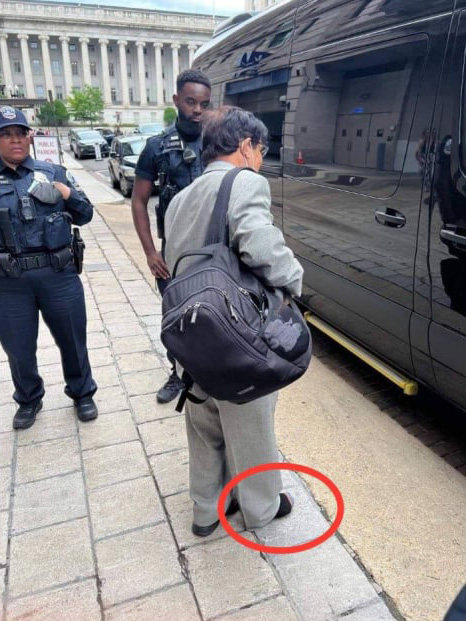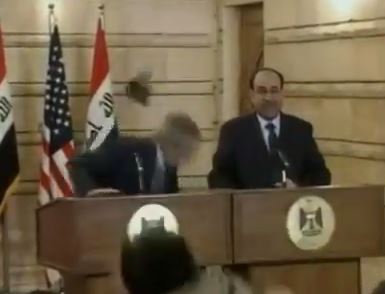PHNOM PENH: The man who slapped French President Emmanuel Macron across the face has been sentenced to four months in prison. Iraqi journalist, Muntadar al-Zaida, who threw his shoes at US President George W. Bush, was sentenced to three years in prison for aggression against a foreign head of state, but was released for good behavior after spending only nine months in jail.
So what about Cambodian-American Ouk Touch, who threw his shoe at Prime Minister Hun Sen? Will he also face imprisonment?
As per the United States Code, 1624. SUBSTANTIVE OFFENSES -- ASSAULT -- 18 U.S.C. § 112, the 75-year-old Cambodian-American could face up to six months in prison or a fine.
According to American attorney and Professor of Law at Columbia Law School, Daniel Richman, Title 18, Section 112 of the U.S. Code offers special protection for “foreign officials, official guests, and internationally protected persons.” Whoever “assaults, strikes, wounds, imprisons, or offers violence” against one of these people can be fined, face imprisonment for up to three years, or both.
“Assault” under common law covers not only the attempt to inflict harm, but also placing someone under the reasonable apprehension of harm, so shoe-throwing might count. If a lenient jury decides that throwing a shoe and missing does not quite rise to the level of assault, they might find the perpetrator guilty of coercing or harassing a foreign official, or obstructing the official in the performance of his duties. These lesser offenses carry a sentence of not more than six months in prison or a fine.
Providing special protection to foreign officials is not a new concept, but an established practice in the United States, as well as in many other countries across the world.
18 U.S.C. § 112(a) “prohibits assaults against foreign officials, official guests, and internationally protected persons (IPPs), and attacks upon the official premises, private accommodations, or means of transport of such persons. The provision also embraces attempts to commit such offenses. By its terms, § 112(a) neither requires proof of injury nor intent to injure a protected person.”
According to the UN Convention on the Prevention and Punishment of Crimes against Internationally Protected Persons (which entered into force in 1977), signatories must take special care to protect foreign heads of state as well as other official representatives. They should also take into account the “grave nature” of threats or attacks against such persons when designating a penalty.
In a similar case, a French court has sentenced a 28-year-old man to four months in prison for slapping French President Emmanuel Macron in the face. The court in the southeast city of Valence convicted Damien Tarel on Thursday on a charge of violence against a person invested with public authority. He was given four months in prison, an additional 14-month suspended sentence, was banned from ever holding public office and from owning weapons for five years. Under French law, the charge of violence against a person invested with public authority is punishable by up to three years’ imprisonment and a fine of €45,000 ($54,000).
As for Cambodian criminal law, Spokesman and Secretary of State for the Ministry of Justice, Chin Malin, shared information on the legal aspects, that violating internationally protected persons is punishable under the Counter-Terrorism law in Chapter 4 from Article 29 to Article 34.
In relation to the above case, he added that Article 30, point 2 of the Anti-Terrorism Law states, “Individuals who intentionally commit violence against internationally protected persons shall be punished by imprisonment from 7 to 15 years.” In cases where the violence is aggravated and results in the death of the victim, the perpetrator will be sentenced to 7 to 15 years in prison, while Article 33 of the Law on Counter-Terrorism stipulates that individuals who threaten to commit crimes against internationally protected persons are sentenced to five to 10 years in prison.
A spokesman for the US Embassy in Cambodia declined to comment on the incident, instead he told EAC News that the United States welcomed Prime Minister Hun Sen and other ASEAN heads of state to Washington for a very successful US-ASEAN Special Summit.
Cambodians are waiting to see the Washington administration's action in the case of the Cambodian-American man who used violence to throw his shoes at Prime Minister Hun Sen, who came to the United States as a guest of US President Joe Biden, and as Co-Chair of the ASEAN-US Special Summit.



























